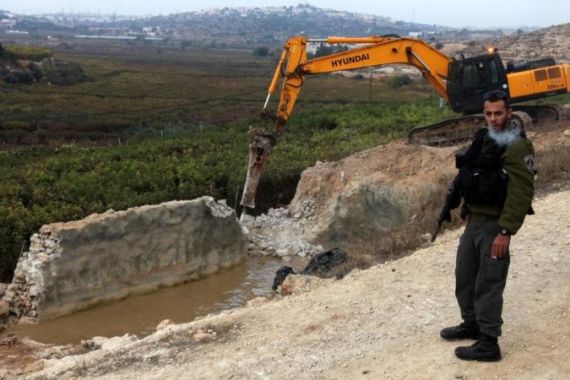Whitewashing apartheid with Israel’s dirty water
The glaring discrepancy in water allocation from West Bank supplies forces Palestinians to rely on water from tankers.

Last week, on June 23, Israeli President Shimon Peres and Chicago Mayor Rahm Emanuel attended a ceremony in Jerusalem in honour of a new joint initiative between Israel’s Ben-Gurion University and the University of Chicago.
Hailing the Peres-Emanuel presence as an instance of “rare political star power”, the Chicago Tribune explains:
“The two schools soon will begin funding a series of research projects aimed at creating nanotechnologies that address water shortages in arid climates. The project’s goal is to find new materials and processes for making clean, fresh drinking water more plentiful and less expensive by 2020.”
Among Israel’s qualifications in the business of dealing with water shortages is, of course, its legendary success in “making the desert bloom” via the removal of Palestinians that began in the 1940s.
Indeed, Peres himself wrote in his 1970 book David’s Sling: The Arming of Israel:
“The country was mostly an empty desert, with only a few islands of Arab settlement, and Israel’s cultivable land today was indeed redeemed from swamp and wilderness.”
The expulsion of more than 750,000 Palestinians during the creation of the state of Israel no doubt assisted somewhat with the cultivation of the “empty desert” myth. Blooming projects have presumably also benefited from Israel’s diversion of various regional bodies of water.
Water apartheid
A 1993 article in The New York Times outlines two competing visions of Israeli water policy:
“What Arabs depict as Israel’s disproportionate use – even theft – of water, Israelis portray as the result of foresight, technological advances like computerised irrigation and good management in securing and exploiting supplies.”
Of course, “theft” would appear to be an accurate description of Israeli practices such as usurping Palestinian springs for the benefit of illegal settlers in the West Bank.
 |
| Spotlight
Gaza Crisis
|
As for managerial deftness in the exploitation of supplies, consider this Reuters report from 2009: “Amnesty says Israel curbing water to Palestinians.” Citing Amnesty International’s calculation that per capita water consumption in Israel was four times higher than in the Palestinian territories, Reuters quotes an Amnesty official’s concern:
“Water is a basic need and a right, but for many Palestinians obtaining even poor-quality, subsistence-level quantities of water has become a luxury that they can barely afford.”
For one thing, the glaring discrepancy in water allocation from West Bank supplies leaves Palestinian residents of the territory reliant on water from tankers that are “forced to take long detours to avoid Israeli military checkpoints and roads off-limits to Palestinians”.
According to a 2012 Oxfam briefing paper, tankered water is up to five times more costly, “further erod[ing] Palestinian farmers’ and herders’ profits, and reduc[ing] their ability to pay for essentials such as food, health care, and education for their children”.
Other scenarios also underscore the irony of Israel’s position at the forefront of the global battle against water scarcity. The Oxfam paper notes:
“Restrictions on granting permits mean that water cisterns used by Palestinian farmers to collect rainwater are frequently demolished by the Israeli authorities.”
A 2013 report by the human rights organisation Al-Haq determined that West Bank settlers currently consume six times more water than their Palestinian neighbours.
Palestinians ‘blame’, Israelis ‘innovate’
In a 2012 dispatch for the ultra-right wing FrontPage Magazine, Jack Schwartzwald, clinical assistant professor of medicine at Brown University, offers a thorough distortion of reality, insisting that “Palestinians steal Israeli water… while Israel exports volumes to the West Bank greatly in excess of what is mandated by the Oslo Accords”.
Schwartzwald glorifies Israel’s technological prowess in the water industry, citing “SmarTap” faucets and drones that detect water pipe leaks, and maintains that, while the Palestinians waste their time “blam[ing] Israel, Israelis work on innovative solutions” to the region’s water crisis.
The problem, of course, is that Israel’s “innovative solutions” are so often dependent on the exploitation of Palestinians. In a 2009 Guardian piece lambasted by Schwartzwald, the paper’s former associate foreign editor Victoria Brittain discusses the lack of uncontaminated water and the unprecedented rate of nitrate poisoning in besieged Gaza, where “sewage and wastewater flows into public spaces and the aquifer”.
According to a 2009 report by the Israeli human rights group B’Tselem, meanwhile, 90-95 percent of Palestinian wastewater in the West Bank is not treated at all, along with a substantial portion of wastewater from the settlements.
In an email to me, West Bank-based environmental expert Alice Gray described Israel’s policy of “‘environmental unilateralism’ – preventing Palestinians from building sewage treatment plants themselves, and then prosecuting them under international law for cross-border pollution”.
The process, it seems, works like a charm:
“Palestinians then have to pay for the construction of sewage treatment plants in Israel. Israel then treats the water to a much higher standard than is actually required under international law (at the expense of the Palestinians) and uses the effluent for agriculture. In the meantime, they create the erroneous impression that the Palestinians lack the organisation, the institutions, the technical expertise and the will to manage their environmental impacts and [that] they need modern, advanced, environmentally responsible Israel to do it for them. This is a camouflage and a greenwash for systematic theft of resources and obstruction of development that is actually destroying the land.”
Manufacturing crisis
Schwartzwald’s enthusiastic greenwashing of “Israel’s life-sustaining desalination plants” and its Desalination Master Plan – the goal of which is to drastically increase the production of potable water via reverse osmosis – conveniently ignores desalination’s role in the discharge of chemicals and resultant disappearance of marine species off the Israeli coast.
Palestinians steal Israeli water… while Israel exports volumes to the West Bank greatly in excess of what is mandated by the Oslo Accords.
Desalination is one of the areas in which Ben-Gurion University and the University of Chicago will collaborate in their apparent quest to combat water shortages. Interestingly enough, however, Alice Gray points out that “[t]he Palestinian water crisis is manufactured – man-made” and that “[t]here is enough water in the region for everybody to have the World Health Organisation’s recommended minimum of 100 litres per person per day without even using up 25 percent of available supplies”.
Of course, this is before factoring in the precedence that Israeli agriculture takes over Palestinian lives.
As a Jerusalem-based water policy consultant commented to me, Israel has in fact made useful contributions in water conservation technologies such as drip irrigation, but “the development of all these ‘technological innovations’ (which are… nothing more than a big business) tends to go hand in hand – in Israel’s case – with unsustainable water practices for the past 60 years… and (ethnic) discrimination regarding water access/rights”.
Regarding the blooming of the desert, she stressed that, paradoxically, the pursuit of “the Zionist dream went hand in hand with serious environmental degradation” in the form of over-pumping of the Coastal Aquifer and other projects.
It remains to be seen what sort of innovative degradation may be achieved by the UChicago-Ben-Gurion alliance. But the attendance by neoliberal privatisation addict Rahm Emanuel at the inaugural ceremony in Jerusalem serves as a reminder of the potential profitability of policies of resource denial vis-à-vis inferior populations. For further reading on Emanuel’s ideology, check out the recent Huffington Post article: “Chicago Schools May Be Forced To Choose Between Toilet Paper, Teachers Due to Budget Cuts”.
In the meantime, leave it to the Israelis to whitewash apartheid with dirty water.
Belen Fernandez is the author of The Imperial Messenger: Thomas Friedman at Work, released by Verso in 2011. She is a member of the Jacobin Magazine editorial board, and her articles have appeared in the London Review of Books blog, Salon, The Baffler, Al Akhbar English and many other publications.
Follow her on Twitter: @MariaBelen_Fdez
